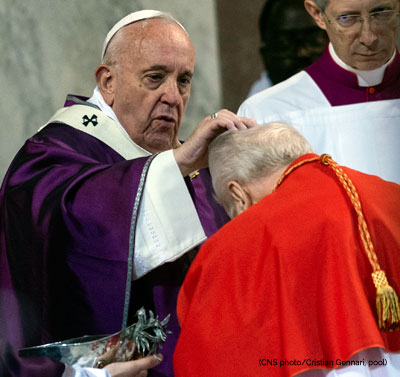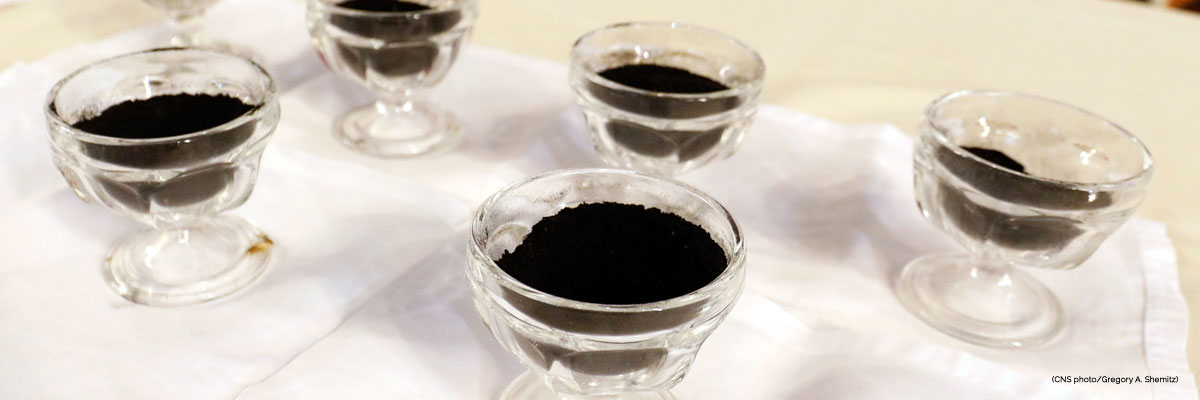Official Website of the
Catholic Diocese of Little Rock
Ashes to be sprinkled over head this year
Published: February 11, 2021
Get Mass Times from Your Parish
Click on the button above to find contact information for a parish near you to get Ash Wednesday Mass times. Confirm the schedule by calling the parish office before attending. Requirements, such as wearing a mask and physical distancing, remain in place to safeguard against COVID-19. In addition, a special Ash Wednesday Collection will be taken up during all Masses in the Diocese of Little Rock.
Ash Wednesday begins our Lenten journey toward the celebration of Easter. Though it is not a holy day of obligation, it is a day of fast and abstinence. Normally, we are marked with ashes, in the form of a cross, on our forehead. However, this year, because of the COVID-19 pandemic, the Vatican has asked that ashes be sprinkled over our heads instead.
In its "Distribution of Ashes in Time of Pandemic," the Vatican's Congregation for Divine Worship and the Sacraments described how priests should bless the ashes to be distributed with holy water silently at the altar and then address "all those present and only once says the formula as it appears in the Roman Missal, applying it to all in general: “Repent, and believe in the Gospel” or “Remember that you are dust, and to dust you shall return”.
After cleansing his hands and putting on a mask, the priest will then distribute "ashes to those who come to him or, if appropriate, he goes to those who are standing in their places. The priest takes the ashes and sprinkles them on the head of each one without saying anything."
Although sprinkling ashes over people's heads is unusual the United States, Bishop Anthony B. Taylor pointed out "that this alternate approach has already been the common practice in some parts of the world" in his letter to priests, deacons and seminarians of the Diocese of Little Rock about the change Jan. 13. Father Jason Tyler, STL, pastor of St. Joseph Church in Fayetteville, explains this method of receiving ashes in the video below. He also demonstrates the method to help people see how it will be done.
Normally, Ash Wednesday Masses are among the most attended Masses of the year. But with physical distancing requirements, there is a limit to how many people can be in a church at one time. Addressing this concern, Bishop Taylor requested and was granted permission from the Vatican for priests serving in the Diocese of Little Rock to celebrate more Masses temporarily.
The Vatican decree allows priests to celebrate up to four Masses on Sundays and holy days of obligation and three Masses on weekdays "in cases of true necessity during this time of the COVID-19 pandemic," explained the bishop in his Jan. 29 letter to priests, deacons and seminarians granting the faculty to all priests serving in Arkansas.
The decree only applies to our diocese and will cease “when the circumstances relating to the COVID-19 pandemic have ceased.” Arkansas Catholic explained that priests are normally allowed to celebrate a "maximum of three Masses on Sundays and two on weekdays. In parishes with only one priest, it has been necessary for a priest to celebrate more Masses on Sunday to allow adequate spacing inside the church."
 So there may be more opportunities to attend Mass on Ash Wednesday this year. Contact your parish directly to get Mass times. Don't let concern over space limitations or changes in distribution keep you from getting your ashes, because the ashes like the whole season of Lent are a time to refocus on our relationship with God, said Father Erik Pohlmeier, diocesan director of faith formation.
So there may be more opportunities to attend Mass on Ash Wednesday this year. Contact your parish directly to get Mass times. Don't let concern over space limitations or changes in distribution keep you from getting your ashes, because the ashes like the whole season of Lent are a time to refocus on our relationship with God, said Father Erik Pohlmeier, diocesan director of faith formation.
"To recall that only with the breath of God can we have life is motivation to reorder whatever part of life needs it. As God breathed life into the dust at the beginning he can breathe new life into those who have fallen into sin," he added. "The ashes are a sign of mortality and a sign of renewal in Christ." Learn more in our Lenten Q&A.
The Old Testament offers several examples of how we have a long tradition of wearing sackcloth and being sprinkled with ashes as a sign of penance as an "outward sign of grief, a mark of humility, mourning, penance and morality," according to Our Sunday Visitor. (See Job 42:6, Daniel 9:3, Jonah 3:6 and 1 Maccabees 3:47.)
"Ashes were imposed on the early catechumens when they began their preparation time for baptism. Confessed sinners of that era were also marked with ashes as part of the public penitential process. Other baptized Christians began asking to receive ashes in a manner similar to catechumens and penitents," according to Our Sunday Visitor. "Christian men had ashes sprinkled on their heads while ashes were used to trace the cross on the forehead of women. ..."
"During the papacy of St. Gregory the Great, the practice was further expanded and is mentioned in the sixth-century Gregorian Sacramentary. Around the year 1000, Abbot Aelfric of the monastery of Eynsham, England, wrote: 'We read in the books both in the Old Law and in the new that men who repented of their sins bestowed on themselves with ashes and clothed their bodies with sackcloth. Now let us do this little at the beginning of our Lent, that we strew ashes upon our heads, to signify that we ought to repent of our sins during the Lenten feast' (“Aelfric’s Lives of Saints,” 1881, p. 263). This same rite of distributing ashes on the Wednesday that begins Lent was recommended for universal use by Pope Urban II at the Synod of Benevento in 1091." Learn more.
The Lenten season offers us the help we need to remember whose we are. It offers us the chance to start anew. That no matter how long it is has been or what we have done, the Lord calls us to come to him. "Even now, says the LORD, return to me with your whole heart." (Joel 2:12) Even though Lent is somber in nature, there should be no fear in our repentance because it is the first step toward the joy and the new life offered on Easter Sunday.
Father Steve Grunow of Word on Fire explains that it does require humility to receive the ashes because these publically mark us as sinners. "What we know privately about ourselves we show to the world. But that we are sinners is not the only truth that we display. The mark of ashes is a sign to the world that we have received something extraordinary and undeserved from the Lord Jesus. What have we received? A word of forgiveness that is creative, living and effective, which if accepted, gives to us and to the world, what we need most — the gift of a new start and the unexpected grace of another chance."




